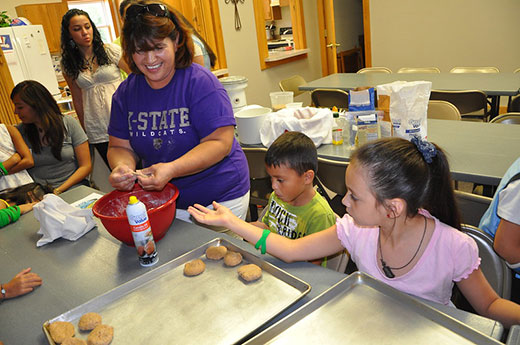
Sharing in the work of preparing meals is a great way for families to interact and develop closer bonds. | Download this photo.
Family meals are important for kids’ development, nutritionist says
Procter outlines benefits of eating together throughout the year
November 25, 2019
MANHATTAN, Kan. – Kansas State University nutrition specialist Sandy Procter says parents are serving up a lot more than nutritious food when they insist that their families eat meals together.
“We could spend hours discussing the benefits,” said Procter, who is also an assistant professor of food nutrition and dietetic health. “In all the research I’ve seen, the more meals that families eat together, the more positive results that are seen in the individual and the family unit.”
Listen to a radio interview with Sandy Procter
Procter said even toddlers benefit from being with family during meal time.
“This is where a lot of useful conversation happens, and young children who aren’t able to speak yet are really picking up on language development and formation,” she said. “It’s shown to be a benefit to them as they’re getting a start at processing words and interacting with conversation.”
As youth grow into the teen years, Procter adds, family meals provide grounding and “a connectedness” to the family’s values.
“We know from research that young pre-teens and teens are less likely to have anti-social and or delinquent tendencies if they have more family meals,” Procter said. “There are some grounding benefits to meals that reach well beyond just the fact that it’s nice for parents to know where everybody is at for a short period of time.”
Procter has developed a publication, Everyone to the Table: Family Meals Serve Us Well, in which she cited studies indicating that only 40% of teens say they eat meals with family three to six times per week. One-third of those surveyed reported eating with their family two or fewer times the previous week, and 14% said they had no family meals.
“Eating together more than five times a week has been found to be linked to better mood and better mental health for kids in the school years, meaning ages 6-10 and teens,” she said. “Sometimes our schedules get so crazy and it’s hard to make it happen. People need to be a little forgiving of themselves and know that it won’t happen every meal, but when you can make it happen, it’s well worth the effort.”
Procter served up a few more thoughts to get the family together around meals:
- Don’t limit family meals to dinner. “If family meals happen at breakfast, that’s great,” she says. The family’s schedule may only allow for morning meals on some days, and evening meals on others. Be flexible.
- Share in the work. Older children may be able to do some of the cooking, while setting the table is more appropriate for others. “Encourage time when everyone is focused on the task. Some of those conversations are more true and meaningful than they might be otherwise,” Procter said.
- Put down the phone. Electronics are a distraction to productive family conversations. “We used to say in my family that the cell phone is not a member of the family. The TV is not a member of the family. So, they are not included in family meals,” Procter said.
“The research around family meals suggests that if your family is one of those that doesn’t have spontaneous conversation, then maybe you could try conversation starters, such as, ‘What are two things that you learned today that surprised you,’” she said.
“We used to laugh about those in my family; we felt like we needed flags or conversation stoppers because everyone tried to talk at the same time. But every family is unique and it may take practice to get those conversations to flow.”
For more tips on family nutrition and health, visit https://www.ksre.k-state.edu/humannutrition.

